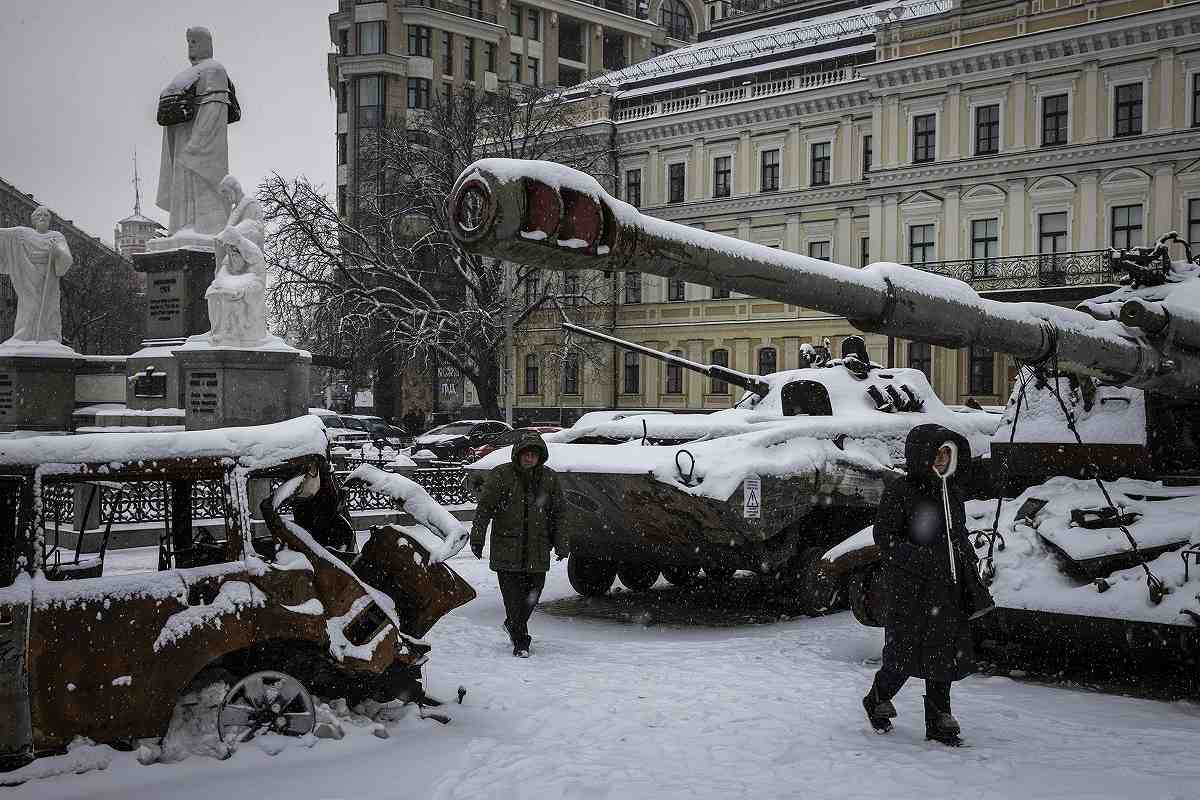
People walk past destroyed Russian military vehicles covered in snow in front of St. Michael’s Golden-Domed Monastery in downtown Kyiv on Dec. 8.
16:51 JST, December 16, 2023
BRUSSELS – The European Union on Thursday agreed to open accession talks with Ukraine, bringing the country a step closer to its dream of joining the bloc, despite lingering concern about its readiness and questions about what welcoming Kyiv would mean for the E.U.
Ukraine would be the bloc’s fifth most populous country and by far the poorest, meaning it would draw substantial subsidies under current E.U. rules.
In Brussels, there is a growing sense that Ukrainian membership would shift the E.U.’s balance of power, impact its agricultural market and upend its budget.
– – –
Changing the E.U.’s balance of power
The E.U. started as a small club of mostly Western European countries. In the years since the fall of the Berlin Wall in 1989 it has expanded to the east.
Russia’s 2022 invasion of Ukraine broadened support for another round of enlargement. In addition to Ukraine, the E.U. on Thursday agreed to open accession talks with Moldova and made Georgia a candidate country. There are several other official candidate countries, including Albania and Montenegro, at various stages in the process.
If it proceeds, this push could turn the 27-member E.U. into a grouping of more than 30 countries, potentially accelerating the eastward shift in the bloc’s balance of power.
If Ukraine joined the E.U. today, it would be the largest new member in terms of population since the 1980s.
Around the European Council table, some decisions are made by unanimity, others by “qualified majority voting,” a system whereby a decision must be approved by 55 percent of the member states representing at least 65 percent of the E.U. population.
According to an analysis from the German Institute of International and Security Affairs, Ukraine would get about 9 percent of votes, roughly the same as Poland’s voting weight today. The shares of other member states would drop, with Germany going from 18.6 percent to 16.9 percent, for instance. Together, Poland and Ukraine would have the same voting weight as Germany.
In the European Parliament, Ukraine would be entitled to a certain number of members, or MEPs. But adding enough members for Ukraine would probably mean exceeding the current limit of 751. This fall, French and German officials introduced a report, written by a team of experts, that argued against adding additional seats in favor of finding a new way to divvy them up.
In Brussels, many countries believe that to absorb Ukraine and others, the E.U. will need to reform its key institutions, parliament included. But first they will need to agree how to do that.
– – –
Absorbing an agricultural powerhouse
Bringing Ukraine into the E.U. is likely to require a rethink of the bloc’s common agricultural policy.
E.U. farmers currently receive subsidies of more than $200 per hectare farmed. Given its vast arable land, Ukraine would be eligible for billions in payments.
Even with membership many years away, the issue of Ukrainian exports entering the E.U. market has spurred protest, with farmers in neighboring countries lashing out over a glut of grain.
In Poland, Ukraine’s impact on grain prices has become a major political issue, with Polish farmers warning they will be swamped by Ukrainian supply.
Ukraine exported about 20 million metric tons a year before the war, according to the United Nations Food and Agriculture Organization, which is more than a third of the bloc’s total grain exports. Poland, meanwhile exports 4 million tons each year.
The dispute has tested ties between Ukraine and Poland, one of its staunchest supporters, and is seen by many as a sign of possible agri-battles to come.
– – –
Really, it’s all about the money
It’s not just grain. As the E.U. begins to imagine what Ukrainian membership would mean, money is one of the major issues, according to analysts.
Ukraine’s per capita gross domestic product was $4,872 in 2021. The same year, GDP in Bulgaria, the current poorest E.U. country, stood at $11,683, according to estimates from the International Monetary Fund.
The war has devastated Ukraine’s economy and deepened its financial needs. A joint European Commission, World Bank and United Nations assessment estimated that the cost of reconstruction and recovery in Ukraine had grown to more than $400 billion – and that was based on the first year of the war alone.
Given that the fighting is still raging and that the membership process could stretch on for many years, if not decades, it is difficult to estimate the financial impact of Ukrainian membership.
Some estimates suggest that Ukrainian membership would turn many net recipients of E.U. funds into net payers. One recent policy paper from Estonia’s International Center for Defense and Security estimated that, if Ukraine were a member today, it might get $20 billion a year from the E.U. budget, with only Spain changing from a net recipient to a net payer.
The author, Michael Emerson, an associate senior research fellow at the Center for European Policy Studies (CEPS), a Brussels-based think tank, said previous rounds of enlargement show that new members can be absorbed. “Over the last 20 years, the 13 new member states acceding since 2014 have been growing macro economically, faster than the average of Europe and indeed, by quite a substantial margin,” he said.
Ilke Toygür, director of the Center for Innovation in Global Politics and Economics at IE University, said Europe will be debating the issue for years to come. “For me the budgetary conversation is the most important conversation,” she said.
“If you would have asked me what single issue E.U. members states should be discussing, it’s the budget.”
– – –
There’s also the issue of security
For years, European leaders argued that bringing Ukraine closer would be a dangerous provocation. Though Russia’s full-scale invasion changed their calculus, the bloc must now consider the security implications of Ukrainian membership – especially since NATO has made clear that it will not welcome Ukraine until after the war.
This is the first time the E.U. is moving to bring in a country that is in the middle of a major war and without NATO protection.
In an article for the Carnegie Endowment for International Peace, Sophia Besch and Eric Ciaramella argue that the bloc has not fully considered the security dimensions of the decision.
“The EU must recognize that, in all likelihood, Ukraine will qualify for membership while still under acute Russian threat and not yet under NATO’s aegis,” they write.
“In its present state, the union is far from able to secure its interests in Ukraine and, eventually, to defend an expanded set of borders against Russian aggression.”
Even as E.U. leaders greenlit accession talks, they failed to agree on roughly $50 billion in funding for Ukraine, raising questions about the union’s ability to keep Ukraine going today – let alone through the years ahead.
Top Articles in News Services
-

Survey Shows False Election Info Perceived as True
-

Hong Kong Ex-Publisher Jimmy Lai’s Sentence Raises International Outcry as China Defends It
-

Japan’s Nikkei Stock Average Touches 58,000 as Yen, Jgbs Rally on Election Fallout (UPDATE 1)
-

Japan’s Nikkei Stock Average Falls as US-Iran Tensions Unsettle Investors (UPDATE 1)
-

Trump Names Former Federal Reserve Governor Warsh as the Next Fed Chair, Replacing Powell
JN ACCESS RANKING
-

Producer Behind Pop Group XG Arrested for Cocaine Possession
-

Japan PM Takaichi’s Cabinet Resigns en Masse
-

Man Infected with Measles Reportedly Dined at Restaurant in Tokyo Station
-

Israeli Ambassador to Japan Speaks about Japan’s Role in the Reconstruction of Gaza
-

Videos Plagiarized, Reposted with False Subtitles Claiming ‘Ryukyu Belongs to China’; Anti-China False Information Also Posted in Japan

























